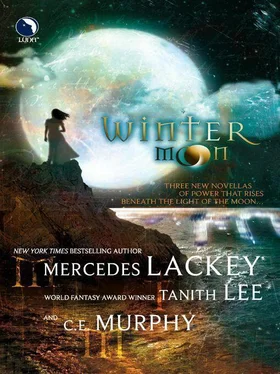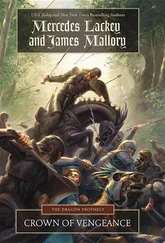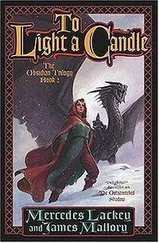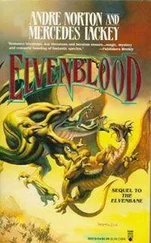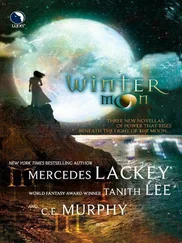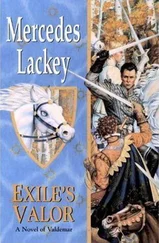The earth hung above, and all the stars.
“There was a way that led us here, beyond the rocks,” he said. “But how do we find it?”
Clirando stared into her mind. There were visions there still, things which came from the magic not only of this place, but from the sorcery of the Isle.
Slowly she said, “There’s home,” nodding at the disk above.
“But the way to it?”
Clirando’s brain showed her the magicians in the square who had called the stars.
Instinctively she raised her arms.
Up in the inky black, the exquisite jewelry shivered. One by one, stars— stars —detached from their moorings. They began to float down, not a swarm now, a snowfall—
If it was a dream, you might do anything. And if not, still you might attempt it.
The stars wove around one another in slow, sparkling tidal surges. She thought of the old woman weaving on the headland, the old man who made snakes at the forest’s end, and of the stilt-walker lighting torches.
High in air, a bridge began to form in a wide, swooping arc. It was laid with coruscating stella stones—emeralds, rubies, amethysts—it curved down toward the surface where they stood, making a hill-road for them to climb. While the rest of the arc soared away like the curve of a bow. Infinities up in the air, the earth disk had received the far point of this incredible bridge, without the tiniest ripple.
They neither debated nor held back. Both he and she ran at the bridge of stars, this extraordinary path that led toward the ordinary, and the mortal.
Simultaneously they leaped, landed. Clirando felt the faceted paving under her feet. Ethereal colors washed them like high waters, now copper, now bronzy, now golden.
Not to sleep so long—it had been worth it, to know a dream like this one.
Both of them laughed. Children laughed like that, innocent, and prepared to credit that dreams came true.
As so often on the Isle, shoulder to shoulder, Clirando and Zemetrios broke into their companionable, well-trained, mile-eating lope. Over the night, over the heavens, running home through the spatial outer dark which, for them, was full of a rich sweet air, mild breezes, summery scents, branches of static stars, rainbows and light, wild music, half-seen winged beings.
Clirando knew no fear, no doubt, and no reticence. She thought idly, as she bounded earthward, This is the truth.
But somewhere, something—oh, it was like a vagrant cloud, feathery and adrift. It bloomed out from nowhere. It poured around her. Zemetrios was concealed. She half turned, missing him, and then a delicate nothingness enveloped her. That too brought no alarm. It was also too good, too true .
And after only a second anyway it was done.
And then—
“Clirando!”
This known female face bending to hers, someone well liked, familiar—
“Tuyamel?”
Clirando’s eyes were clearing. She stared into six faces now, all known, all in their way loved. Her girls, the women of her band.
“Lie still, Cliro,” said Tuy firmly. “You’ve flown such a great way off, and had such a long journey back.”
They were sworn to secrecy, they assured her, all of them. No one who came here must ever afterward speak of the secrets of Moon Isle. Besides, they knew very little.
“Certain persons—they go to certain places. The priests—and the gods—direct them. Some even go—so we heard—to the moon itself. And you went somewhere, Cliro. That’s what they said.”
Her band told her how, the morning after they had beached their boat on the strand of the Isle, they had found her unconscious, and had not been able to rouse her. Though she breathed, she seemed all but dead. And so they picked her up on a litter improvised from cloaks, and bore her inland.
An ancient priestess by a beacon on the cliff top declared Clirando had suffered no awful harm. “She has not slept a while,” the priestess said. “Now she must.”
So Clirando’s loyal girls carried her, with much care and attention, to one of the seven inland villages of the island.
“Every night of the full moon you lay here,” lamented Seleti.
“We tried to wake you—the moon was full for seven nights!”—Draisis—“But you never stirred.”
“And the old priest, the one with the pet snakes he names after jewels—he said we must let you slumber. You were so young, he said,” affrontedly added Erma, “you would certainly see in your lifetime several more such seasons of seven moons.”
“You missed all the festivities,” elaborated Oani.
“Jugglers—magicians—” Vlis.
“One of them made a bridge over the sky, all like precious stones—green, red, mauve, yellow—” Tuyamel. “Though I knew it was all a trick.”
Clirando lay on the narrow pallet, in the cell of the temple in Seventh Village.
Her heart beat leadenly.
It had been— all of it—a dream?
And yet, she had been enabled to throw away the negative and hateful things. Only proper grief and regret remained. Except…Zemetrios.
If all this had been a dream—including even, as it had, transcripts of actual external things—what had Zemetrios been? His thoughts, his personality—his mouth, his arms?
She lay a few days in the little Temple of the Maiden. Then, when she had recovered enough, Clirando roamed through its courts, admiring columns and the flowering vines on its walls—for summer had continued uninterrupted in the world. Here and there, meeting others, she mentioned a particular name. “Zemetrios?” they asked, the mild priestesses. “Warrior,” they said to her, not unkindly, “no one may be told anything more than the minimum of any other here. This is Moon Isle. For those like yourself, or the man you mention, what each does and experiences is a private matter. Only they and the gods can know.”
So they would tell her nothing. And was there anything to learn?
Everything else had been her dream, so why not this golden man? She had wanted a lover. Tranced or asleep she had had one.
And now she knew for sure she loved him? Well then. She loved a figment of her dreams. She would not be the first or last.
Two days following the celebration of the Seven Nights, which all of them repeatedly reminded her she had missed, Clirando walked around the village.
It was not at all like the one she had seen when asleep. The buildings were clean and garishly painted. The three or four temples were garlanded, and that of the Maiden had walls of deep red patterned with silver crescents.
Just as she had heard, priests and priestesses thronged the Isle, and lingering warrior bands were there too traders and performers, but now the processions and shows were over. A great packing up was going on. A great leave-taking.
And neither was it any use to question these people, let alone the villagers, who seemed educated in coy evasions. There seemed too a polite, unspoken wish that visitors should go. It began to make her band uneasy, and soon enough Clirando, as well.
I threw off my guilt. I must throw off this also.
She slept always soundly at night. She did not dream, she thought, at all, as if she had used all her dreaming up. Would she ever see the ghost of Araitha again? Or him—would she ever see Zemetrios again? No. Never.
On the fourth day they set off along the forest track. It was rather as Clirando had visualized it, but then her girls had carried her this way. Now animals and birds abounded. A statue marked either end of the road, island gods, nicely carved. Clirando thrust her introspection from her. She acted out being her ordinary self, calling it back to her. It came.
Meanwhile her girls were so attentive and careful of her that Clirando eventually lost her temper. “Leave off treating me like some fragile shard of ancient pottery! What will you do on the boat? Wrap a shawl over my legs and pat me on the head?”
Читать дальше
